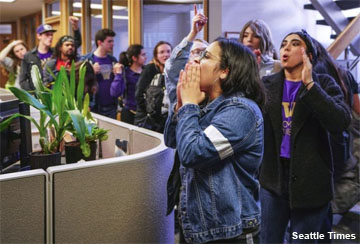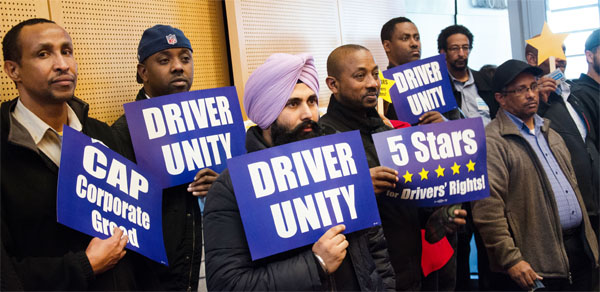NEWS ROUNDUP
UW student solidarity | Unequal OT pay | Trump’s in trouble
Tuesday, April 10, 2018
LOCAL
 ► In today’s Seattle Times — Students protest possible closure of UW Medical laundry; 100 jobs at risk — More than a dozen University of Washington students occupied the office of UW Medicine’s CEO Monday afternoon to protest the possibility that the university might close a hospital laundry facility with more than 100 employees.
► In today’s Seattle Times — Students protest possible closure of UW Medical laundry; 100 jobs at risk — More than a dozen University of Washington students occupied the office of UW Medicine’s CEO Monday afternoon to protest the possibility that the university might close a hospital laundry facility with more than 100 employees.
► From The Stranger — UW students occupy building to protest closure of unionized laundry — About 20 students are currently occupying UW Medicine administrative offices urging the university not to shutter its laundry service. The laundry currently employs about 100 people who clean linens and scrubs for University of Washington Medicine hospitals and clinics.
► From KNKX — UW Postdocs are trying to unionize. But what is a Postdoc, anyway? — Post-doctoral researchers at the University of Washington are trying to form a union to negotiate better wages and working conditions. They’re kind of like apprentices. They are done with school, but they aren’t ready to become fully-fledged professors.
ALSO at The Stand — Univ. of Washington Postdocs’ union election will proceed — UW President Ana Mari Cauce and the UW administration has agreed to take the necessary steps to schedule a Postdoc union vote. However, no vote has been scheduled yet.
► In today’s Seattle Times — Kent teachers union calls for resignation of superintendent — The Kent teachers union passed a resolution calling for the resignation of the Kent School District’s superintendent and human-resources chief after threats of more than 100 teacher layoffs.
 ► From KUOW — Seattle wants new rules for Uber and Lyft. Here’s what that could mean. — The Seattle City Council unanimously passed a resolution Monday to consider regulating transportation network companies like Uber and Lyft. The city could end up raising base fares to $2.40, which is the minimum fare charged by taxis. Currently, both Lyft and Uber charge $1.35 as a base fare in Seattle… “They want to make sure there’s a fair wage for Uber and Lyft drivers — that they’re not being paid under minimum wage. And for those who are driving full time, they can really put food on the table.”
► From KUOW — Seattle wants new rules for Uber and Lyft. Here’s what that could mean. — The Seattle City Council unanimously passed a resolution Monday to consider regulating transportation network companies like Uber and Lyft. The city could end up raising base fares to $2.40, which is the minimum fare charged by taxis. Currently, both Lyft and Uber charge $1.35 as a base fare in Seattle… “They want to make sure there’s a fair wage for Uber and Lyft drivers — that they’re not being paid under minimum wage. And for those who are driving full time, they can really put food on the table.”
► In the Wenatchee World — Tri-Cities has a pollution problem. If we don’t fix it, the feds could do it for us — After finding unhealthy ozone levels in the Tri-Cities air in 2015 that were nearly as high as those downwind of Seattle, the Washington Department of Ecology launched a study with support from the Benton Clean Air Agency. The results are in — and the 2015 ozone levels were no fluke.
► In the Wenatchee World — Construction industry continues to build jobs — Construction remains the fastest-growing industry in Chelan and Douglas counties, accounting for 400 new jobs added in the region from February 2017 to February 2018. The 18.2 percent increase, from 2,200 to 2,600 jobs, is higher than the industry growth statewide.
► In today’s (Everett) Herald — Infusion of federal money boosts the second Swift bus route — Community Transit’s second bus rapid transit line, from Bothell to Paine Field, is to open next year.
► In today’s Seattle Times — King County Democrats chair Bailey Stober resigns amid harassment allegations — After a marathon 13-hour party meeting Sunday, 26-year-old Stober announced his resignation. He was accused of “harassment, intimidation and creation of a hostile work environment.”
EQUAL PAY DAY
► From Crosscut — Seattle’s gender wage gap is worse than we thought — In 2017, women in Seattle’s transportation and utilities departments earned just 8 percent of all overtime pay, despite comprising 35 percent of the workforce, according to data from the city. In real terms, where men across three of the city’s largest departments — Transportation, Public Utilities and City Light — brought home about $39 million in extra pay last year, women earned just $4 million. That’s despite the fact that women on average were hired to work nearly the same number of regular hours per year.
ALSO at The Stand — Celebrate state’s progress Tuesday on Equal Pay Day in Seattle — Hill City Tap House is marking Equal Pay Day from 5:30 to 8:30 p.m. on Tuesday, April 10 to celebrate Washington state’s newest equal pay law and build awareness about the state’s $18 billion wage gap.
Once again, Washington state leads the nation on equal pay (March 22, 2018) — Washington was one the first states in the union to address the wage gap by passing the Equal Pay Act in 1943. On Wednesday, the state made history again by adding additional provisions aimed at closing the gap between what women and men are paid as Gov. Jay Inslee, surrounded by with lawmakers, advocates and supporters, signed the Equal Pay Opportunity Act into law.
► From The Hill — Federal appeals court rules prior salary can’t justify gender pay gap — A federal appeals court on Monday ruled that employers can’t use prior salary amounts to justify paying men more than women. In writing the majority opinion in the case, which was heard before the full panel of judges on the 9th Circuit Court of Appeals, Judge Stephen Reinhardt called the gender pay gap an embarrassing reality despite the Equal Pay Act of 1963.
BOEING
► From Reuters — Airbus suspends A320 revamp study amid output problems — Airbus has shelved advanced studies aimed at improving its A320neo jet family, designed in part to fend off a mid-market plane that Boeing hopes to build. The surprise decision to back away from the proposed “A320neo-plus” and “A321neo-plus,” which would lengthen and modernize both models, comes as Airbus continues to face problems in increasing output for the current versions.
THAT WASHINGTON
 ► In the Washington Post — Three months into the tax cuts, significant wage gains seem elusive — February’s blockbuster jobs report was not matched by the March number. The economy added 103,000 jobs last month, and the number of jobs created in January and February was adjusted downward by 50,000 (down 63,000 in January and up 13,000 in February). The December tax cuts were sold on the promise that they would boost an already-strong economy, driving up wages and increasing job growth. The February jobs numbers seemed like possible evidence on that second point, and wage numbers from the January report suggested that wages were on their way up. In the March jobs report, the picture isn’t as clear.
► In the Washington Post — Three months into the tax cuts, significant wage gains seem elusive — February’s blockbuster jobs report was not matched by the March number. The economy added 103,000 jobs last month, and the number of jobs created in January and February was adjusted downward by 50,000 (down 63,000 in January and up 13,000 in February). The December tax cuts were sold on the promise that they would boost an already-strong economy, driving up wages and increasing job growth. The February jobs numbers seemed like possible evidence on that second point, and wage numbers from the January report suggested that wages were on their way up. In the March jobs report, the picture isn’t as clear.
► In today’s NY Times — Federal deficit projected to top $1 trillion by 2020 — The new Congressional Budget Office analysis, which includes the cost of the Republican tax cuts, projects the national debt to reach a level economists say could court a crisis.
► In today’s Washington Post — ‘We could be collateral damage’: A family, town caught in Trump’s trade war — As Washington and Beijing swap threats in their escalating trade dispute, a farmer and his steelworker father-in-law show how global commerce is marbled through communities across the country.
► From TPM — Trump: If farmers get hit, they’ll understand
OBSTRUCTION OF JUSTICE
 ► In today’s Washington Post — Trump’s attorney under investigation for possible bank fraud, campaign finance violations — FBI agents raided Michael Cohen’s Manhattan office, home and hotel room, seizing records about his clients and personal finances. Among the records taken were those related to a 2016 payment Cohen made to adult-film star Stormy Daniels, who claims to have had a sexual encounter with President Trump.
► In today’s Washington Post — Trump’s attorney under investigation for possible bank fraud, campaign finance violations — FBI agents raided Michael Cohen’s Manhattan office, home and hotel room, seizing records about his clients and personal finances. Among the records taken were those related to a 2016 payment Cohen made to adult-film star Stormy Daniels, who claims to have had a sexual encounter with President Trump.
► In today’s NY Times — Why the FBI raid is perilous for Michael Cohen — and Trump (by Ken White) — If a client is using an attorney’s services for the purpose of engaging in crime or fraud, there is no privilege.
► In today’s NY Times — Trump denounces FBI raid on his lawyer’s office as ‘attack on our country’ — “We’ll see what may happen,” Trump said as he began a meeting with senior military officials to discuss responses to a chemical attack in Syria. “Many people have said, ‘You should fire him.’”
MINISTRY OF PROPAGANDA
► From The Guardian — Sinclair TV chairman to Trump: ‘We are here to deliver your message’ — The chairman of Sinclair Broadcast Group met Donald Trump during the 2016 election campaign, where he told the future president: “We are here to deliver your message.”
 ► From The Guardian — These Americans are trapped in their jobs: they need to pay $10,000 to quit (by Terri Gerstein) — Dozens of news anchors robotically intoned “This is extremely dangerous to our democracy,” after reciting what turned out to be a script by Sinclair Broadcast Group, owner and operator of 193 local TV stations. Dan Rather called it Orwellian, and many have asked in amazement: why would local journalists across the nation allow themselves to be used in such a demeaning way? The answer is clear to me, as a lawyer with decades handling cases involving low-wage workers: people need jobs. But the anchors may have an even more specific concern: an employment contract that doesn’t just bind but entraps them.
► From The Guardian — These Americans are trapped in their jobs: they need to pay $10,000 to quit (by Terri Gerstein) — Dozens of news anchors robotically intoned “This is extremely dangerous to our democracy,” after reciting what turned out to be a script by Sinclair Broadcast Group, owner and operator of 193 local TV stations. Dan Rather called it Orwellian, and many have asked in amazement: why would local journalists across the nation allow themselves to be used in such a demeaning way? The answer is clear to me, as a lawyer with decades handling cases involving low-wage workers: people need jobs. But the anchors may have an even more specific concern: an employment contract that doesn’t just bind but entraps them.
► In today’s (Everett) Herald — A growing threat to local coverage of news (editorial) — As Sinclair works toward the FCC’s approval of its $3.9 billion acquisition of Tribune Media and several dozen more TV stations — including KCPQ-TV, Channel 13, in Tacoma — some are noticing not only an emphasis on politics but a direction for news coverage that is de-emphasizing coverage of local politics while increasing coverage of national political topics, part of a longer-term and wider decline in coverage of local government and politics.
► From TPM — Sinclair commentator resigns after threatening to sexually assault Parkland survivor — Jamie Allman, a conservative commentator for a St. Louis Sinclair-owned ABC affiliate station has reportedly resigned following his Twitter threats to sexually assault Parkland school shooting survivor David Hogg, who has increasingly become the target of conservatives and the far-right’s ire.
NATIONAL
 ► From The Hill — Teachers union threatens to cut ties with Wells Fargo over NRA support — AFT President Randi Weingarten has been in talks with Wells Fargo CEO Tim Sloan about the partnerships, according to the release. The group praised other companies, including Dick’s Sporting Goods and REI, that cut ties with the NRA or changed their policies on gun sales in the wake of the mass shooting at a Florida high school in February. “We’re issuing Wells Fargo an ultimatum—they can have a mortgage market that includes America’s teachers, or they can continue to do business with the NRA and gun manufacturers,” Weingarten said in the statement. “They can’t do both.”
► From The Hill — Teachers union threatens to cut ties with Wells Fargo over NRA support — AFT President Randi Weingarten has been in talks with Wells Fargo CEO Tim Sloan about the partnerships, according to the release. The group praised other companies, including Dick’s Sporting Goods and REI, that cut ties with the NRA or changed their policies on gun sales in the wake of the mass shooting at a Florida high school in February. “We’re issuing Wells Fargo an ultimatum—they can have a mortgage market that includes America’s teachers, or they can continue to do business with the NRA and gun manufacturers,” Weingarten said in the statement. “They can’t do both.”
► In today’s NY Times — Escapes, riots and beatings. But states can’t seem to ditch private prisons. — The staying power of Management & Training Corporation and GEO Group shows how private prisons maintain their hold on the nation’s criminal justice system despite large-scale failures. The field is dominated by a handful of companies who have swallowed the competition and entrenched their positions through aggressive lawyering, intricate financial arrangements and in some cases, according to lawsuits by the Mississippi attorney general, bribery and kickbacks.
EDITOR’S NOTE — This is what happens when you privatize public services and dismantle or sell off the public infrastructure necessary to provide those services. Any short-term savings that may have resulted disappears, and your state is then at the mercy of the only private companies capable of providing that service.
► In today’s Tulsa World — Over 500,000 students statewide out of school Monday as walkout continues into second week — Thousands of teachers rallied Monday at the state Capitol as the protest over pay and school funding continued into its sixth day.
TODAY’S MUST-READ
 ► From the American Constitution Society — Teachers walkout without bargaining rights – why it matters for Janus (by NEA senior counsel Jason Walta) — The scene playing out now should put the Supreme Court on notice as it considers a ruling in Janus v. AFSCME. It is no coincidence that West Virginia, Oklahoma, Kentucky, and Arizona are all so-called “right to work” states with weak or no public-sector collective-bargaining laws. In states like these — where anti-union laws frustrate educators’ ability to come together to advocate for quality public schools through the stable, formal channels of mature collective bargaining — the only meaningful option available is for educators to press their demands through mass protest and the disruptions in public services that those entail. It doesn’t have to be this way. When educators can join together and bargain effectively as partners with school administrators, the benefits to all are clear. The improved teacher salaries and school funding that accompany these arrangements translate into a more skilled and stable teaching workforce, which in turn equips our students and communities for success.
► From the American Constitution Society — Teachers walkout without bargaining rights – why it matters for Janus (by NEA senior counsel Jason Walta) — The scene playing out now should put the Supreme Court on notice as it considers a ruling in Janus v. AFSCME. It is no coincidence that West Virginia, Oklahoma, Kentucky, and Arizona are all so-called “right to work” states with weak or no public-sector collective-bargaining laws. In states like these — where anti-union laws frustrate educators’ ability to come together to advocate for quality public schools through the stable, formal channels of mature collective bargaining — the only meaningful option available is for educators to press their demands through mass protest and the disruptions in public services that those entail. It doesn’t have to be this way. When educators can join together and bargain effectively as partners with school administrators, the benefits to all are clear. The improved teacher salaries and school funding that accompany these arrangements translate into a more skilled and stable teaching workforce, which in turn equips our students and communities for success.
The Stand posts links to Washington state and national news of interest every weekday morning by 10 a.m.






